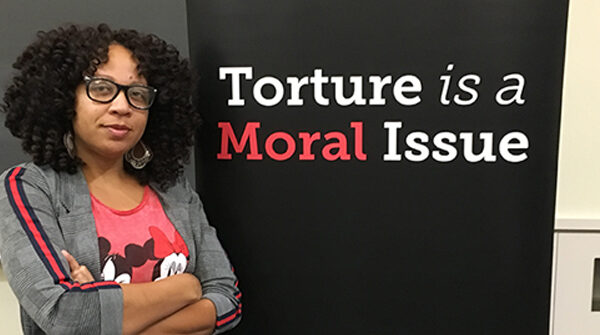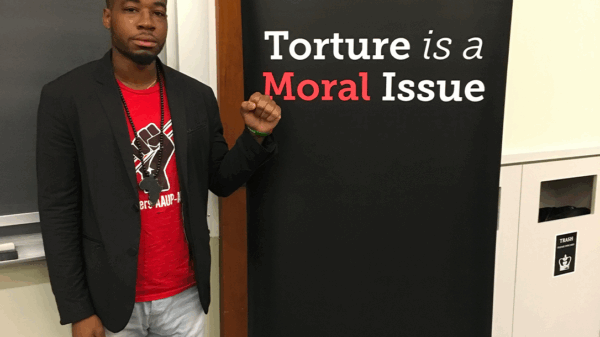Interview courtesy of New Jersey Prison Justice Watch.
In 2006, Nafeesah Goldsmith was 26 years old when she was placed in solitary confinement for 60 days at New Jersey State Prison. She was locked in her cell for 23 hours a day, sometimes 24 hours a day.
Nafeesah was released from prison on June 23, 2015, and is now pursuing a Master’s degree at Monmouth University and works as a community organizer with New Jersey Together.
Nafeesah spoke with New Jersey Prison Justice Watch about her experience with solitary confinement.
What was your access to showers and feminine hygiene products?
We were supposed to shower every day but a lot of times, depending on how the officers feel you may not get out to shower for a few days.
If you don't have any sanitary napkins and you ask for some, some of the officers will say to you, “Use a sock or use toilet paper because they don't feel like going to go get those things for you.”
What was it like to be denied sanitary napkins?
You felt like an animal. You felt just like an animal. Like, come on. I'm a human being. You know, regardless of what reason I'm in prison. I'm still a human being and it makes you feel, it makes you feel like shit. That's what it makes you feel like.
Can you describe a typical day and night in solitary?
Breakfast around like 6 a.m. Many of us wouldn’t like the food so most times I would just sleep through breakfast. I might try to have the coffee but that was horrible. Therefore you may want to save a piece of toast or boiled egg to eat for later.
But for the most part I would sleep until about lunch.
I read quite a bit. And that's how you escape so writing letters, listening to music was a pass-time (sic) because you have your Walkman radio. That was it for me.
Usually what happens is right after lunch you can go out to rec [but] it has to be your rec day. You have to be stripped in your cell. You can't have any clothes on when they come and you have to pass your clothes through the slot to the officers. While you're in your cell they can see you through glass and instruct you on what do -- raising your feet, squatting and coughing, lifting your breasts, checking your mouth. That was a part of the procedure just going out to rec.
At night it all depends on who was next door to your cell. You could stay up and talk to them or find some sort of entertainment like we would do things that were really entertaining for us. We would play games like “In the mix.” Someone would sing a song and they'd sing it up until a certain point and then they'll say -- “In the mix.” Then the next person would pick up where they left off. We would do that for hours.
We'd play hangman. All sorts of stuff just to try to keep ourselves from going crazy.
How did you play hangman?
Basically you would tell the person however many spaces was for the phrase or the word and say, “name of a person, place or thing.” And you'd tell them how many spaces it is. They will just start guessing letters and as they start to fill it out they're also writing it down on their paper in their cell and that's how we would do it.
How would you explain solitary?
I would describe it as being an animal in a cage. That's it. There's no fancy way to paint the picture.
Why is it important to speak out?
We have to take ownership of our own stories and experiences. Our oppressors are the ones who normally take ownership of the narrative and it's never the right story therefore I would rather speak up and state my name and let my truth be told because if I don't do it, somebody else will and it won't be my experience.
How would you describe solitary with one word?
Diabolical. Because it is. Only an evil mind would think to create a system where you lock people away. It's like being in a dungeon. That's evil as shit.
Do you have anything else to add?
I would say that when referencing individuals who have experience with solitary confinement, the term survivor should be used-- It shows that the individual is a human being who survived conditions that the masses will never fathom. I think when we do talk about this we definitely have to make it known as to why we are survivors, because we are.
To read more solitary survivor stories, visit the NJ Prison Justice Watch website.



